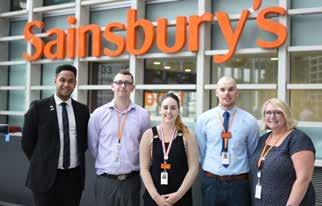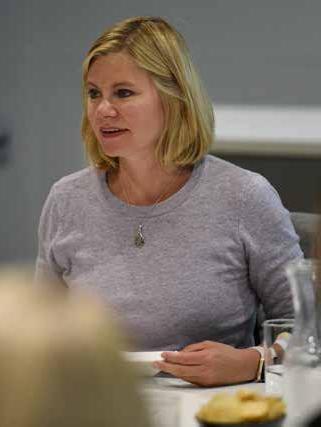
5 minute read
SHOP WINDOW
SPOTLIGHT ON JUDITH BATCHELAR AND SAINSBURY’S
Putting opportunities in the shop window
JUDITH BATCHELAR, DIRECTOR OF SAINSBURY’S BRAND, SPEAKS TO JUSTINE GREENING AT A TIME WHEN THE IMPORTANCE OF SUPERMARKETS IN FEEDING THE NATION HAS NEVER BEEN MORE APPARENT.




QJG// You have literally kept Britain fed throughout the COVID-19 crisis. It must have been a massive challenge behind the scenes to suddenly react to a lockdown and the behaviours we saw from people rushing to try and make sure their family was going to be fed.

AJB// We move around 27 million cases of things around the country a week as a maximum at Christmas. That’s probably for 10 days in the run up to Christmas. We plan for it all year and then we heave a huge sigh of relief and lie down on Christmas Day and Boxing Day and then come back and start again. But with [the crisis] it was like Christmas every day and it went on and on and there was no let up, it was pretty relentless. When I think of all the things we did to maximise how we could get goods through the system, it really was quite phenomenal.

Q// The staff in the stores were incredible and have really redefined the impression of a key worker.
A// We’ve always had a really strong culture of volunteering in our business, but the things that people were doing [were amazing]. People were coming off night shift and doing the shopping for people who couldn’t get online orders and then delivering it to them on their way home. It was way beyond the call of duty. It’s quite emotional actually thinking about the lengths that people went to to help each other. In many respects, it’s a crisis that brought out the best in people and we should capture it.
There is nothing better than seeing a colleague “ doing a variety of jobs and progressing
Q// And I think the challenge now is, how do you make sure you don’t lose that sense of ‘the art of the possible’.
A// One of the really refreshing things was the way that different sectors worked together, and also different stakeholders, whether that was governments, regulators, NGOs and charities. If you talk about a team effort, every morning we had a food resilience forum with Defra with 120 people on that call. Between us, we were all the people that could make things happen. We’d have the call in the morning, catch up in the afternoon, and by the next morning, whatever it was we’d agreed, we’d done it. That level of scale and the pace at which we were moving, just shows that you can do big stuff in short periods of time if you have to.
Q// It underlines that it’s people who make things happen. That’s why social mobility matters to me, because the more you can unleash people to be the best version of themselves, the more incredible stuff they will do. And at the heart of it is just giving them the chance to be able to do that. Tell us a little bit about the role that social mobility plays within Sainsbury’s.
A// I suppose the first really material point is that we are a massive employer. We have 185,000 colleagues in our business, and most of those colleagues are not sitting in some great big office in the middle of London like me today. They are in stores spread far and wide. A lot of them will be joining us from their local community, from school or further education and, for many people, we are their first employer. That brings responsibility with it. And when you’re spending so much of your time at work, that work has to be purposeful, it has to be rewarding and it has to give you some hope and vision for the future and how you might develop in that role. For me, there is nothing better than seeing a colleague that has never worked anywhere else, doing a variety of jobs, their careers progressing and seeing them be very successful; and actually being really quite important in their own communities. If you imagine that in a store, we might be
employing anything from five people to 800 in some of the big stores, working lots of shifts, the teams that are working there play a big role in their local community. If we’re not driving that social mobility agenda, and people aren’t seeing the possibilities, then the role that we can play and the purpose that we have within that community is suboptimal. That’s why we invest in it. That’s why we have massive apprenticeship programmes. That’s why we have programmes for women and why we champion diversity and inclusion, and all the things that we do that we take for granted as being normal. But I know that they’re not normal and they don’t happen everywhere else.
Q// Tell us a little bit about some of the different things that Sainsbury’s does that can have a real impact.
A// I think the way that we have championed apprenticeship programmes, and particularly those apprenticeship programmes that really do take people on their learning journey, right from first principles all the way through to degrees and expert qualifications in certain areas. These can be anything from accounting to the skills of a master baker, fishmonger or butcher. We’ve put a lot of effort into those programmes. Sometimes income is a barrier to education. I was lucky enough to grow up at a time when, if your parents couldn’t afford it, you got a full grant to go university and didn’t end up having massive debts to pay off, which is what young people do now and it becomes a barrier or a burden later. [Apprenticeships provide the opportunity] to train on the job, work on the job and develop your skills and capability over years - and lots of these apprenticeship programmes aren’t all about young people, they continue through lifelong learning. I think all of our investment in that is exemplary and I’m hugely proud of my colleagues working in HR and managing those programmes.










